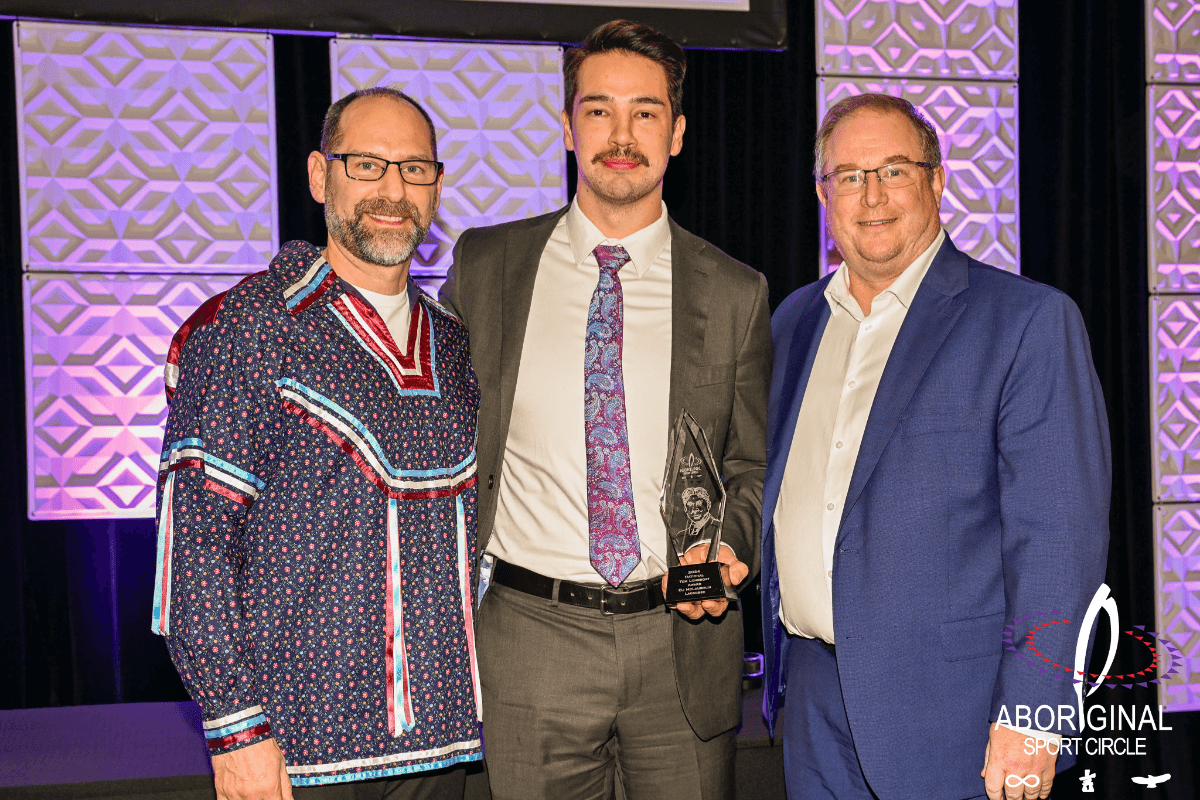Author: BC Sports Hall of Fame
Published: November 5th, 2024
Indigenous Veterans Day

Tom Longboat (Right) | Credit: Canada. Dept. of National Defence/Library and Archives Canada
Despite the injustices and systemic oppression that Indigenous peoples have faced due to colonization, over 12,000 First Nations, Métis, and Inuit people have served in Canada’s military efforts. To honour Indigenous peoples’ contributions to the Canadian military, November 8th has been established as Indigenous Veterans Day. In 1993, Winnipeg became the first municipality to honour First Nations, Métis, and Inuit people who have served our country. Timed with the opening of an exhibit entitled Remember our Warriors, Mayor of Winnipeg Susan A. Thompson signed an official proclamation to recognize the historically overlooked contributions of Indigenous veterans. Officially recognized by the province of Manitoba in 1994, Indigenous Veterans Day slowly started to be adopted by other provinces and territories across Canada. With hopes of continuing the support and recognition of Indigenous Veterans Day, the National Aboriginal Veterans Association worked towards creating a physical monument dedicated to Indigenous veterans in Canada. On National Indigenous Peoples Day in 2001, the National Aboriginal Veterans Monument was unveiled in Ottawa in Confederation Park. Sculpted by Lloyd Pinay from Peepeekisis First Nation, the monument was designed to reflect all Indigenous peoples in Canada. The sculpture represents the men and women who drew their strength from the natural world and who played a part in Canada’s military history.

Credit: Charles A. Aylett / Library and Archives Canada / C-014090
A Digital Indigenous Sport Gallery featured athlete and namesake of the award for Canada’s top Indigenous athlete, Tom Longboat, was one of 4,000 Indigenous people who served during World War I. In February 1916, Tom voluntarily enlisted in the Canadian Armed Forces. As an athlete, Tom was originally recruited by the 180th (Sportsmen’s) Battalion but was transferred to the 107th (Timber Wolf) Battalion. Tom spent much of the war as a dispatch carrier, relaying orders and messages between Canadian military units on the Western Front, mainly in Belgium and France. To celebrate Dominion Day, now known as Canada Day, in 1918 the Canadian Expeditionary Forces created a massive celebration in Tincques, Frances as a way of uniting forces and boosting morale. A part of the festivities included the Canadian Corps championship, which included baseball, soccer, tug-of-war, and track and field competitions. Tom continued training and competing in sporting competitions while serving on the Western Front and won the eight-mile race during the 1918 Dominion Day celebrations. Life as a dispatch carrier was dangerous, Tom was injured twice in action and even was declared dead, but he survived World War I and returned to Canada in 1919. Through the Soldier Settlement Act, World War I veterans were given access to loans for purchasing land, livestock or farming equipment to ease the transition back into everyday life. Indigenous veterans were not granted the same access to land and loans as other veterans. In the 1920s Tom moved to Alberta to collect land in return for his military service but like many Indigenous veterans was denied this and the start of a new life. Tom spent the rest of his career working in Buffalo, New York and Toronto before returning to his community prior to his death in 1949. As one of Canada’s best-known athletes of the early 20th century, Tom’s legacy as an athlete and veteran continues to be seen today.
To learn more about the contributions of Indigenous veterans, visit Veterans Affairs Canada for additional stories, lesson plans, videos and resources.
RELATED BLOGS
View All
Apr 1st, 2025
Un an de la Galerie numérique des sports autochtones
Il y a trois ans, le projet de numérisation a été lancé dans le but d’accroître l’accessibilité de la Galerie des sports autochtones et de mettre en valeur les réalisations et les contributions des athlètes, entraîneurs et bâtisseurs autochtones au patrimoine sportif de la Colombie-Britannique.

Apr 1st, 2025
One Year of the Digital Indigenous Sport Gallery
Three years ago the digitization project was started with the goal of increasing the accessibility of the Indigenous Sport Gallery and to highlight the accomplishments and contributions of Indigenous athletes, coaches and builders to British Columbia’s sport heritage.

Jan 22nd, 2025
Excellence de la Colombie-Britannique – Lauréats du prix Tom Longboat 2024
Créé en 1951, le prix Tom Longboat est décerné chaque année à des athlètes autochtones pour souligner leur excellence sportive et leur contribution exceptionnelle au sport au Canada. Lors du premier gala national des sports autochtones, qui s’est déroulé sur le territoire traditionnel et non cédé de la nation algonquine anishinaabe à Ottawa, en Ontario, les gagnants régionaux de la Colombie-Britannique, Eli McLaughlin et Justina Di Stasio, ont reçu le prix Tom Longboat en tant que meilleurs athlètes autochtones masculins et féminins du Canada.